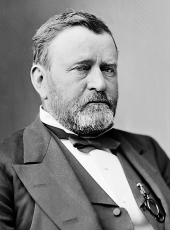To the Senate of the United States:
I return herewith without my approval Senate bill No. 273, entitled "An act for the relief of Rollin White," for the reasons set forth in the accompanying communication, dated December 11, 1869, from the Chief of Ordnance.
U. S. GRANT.
ORDNANCE OFFICE, WAR DEPARTMENT,
Washington, December 11, 1869.
Hon. W. W. BELKNAP,
Secretary of War.
SIR: In the year 1855 Rollin White obtained letters patent for improvements in repeating pistols, in (among other things) extending the chambers of the rotating cylinder through to the rear, so as to enable the chambers to be charged at the rear by hand or by a self-acting charger.
Some time afterwards, and prior to the breaking out of the rebellion, he assigned this patent to Smith & Wesson, of Springfield, Mass., for the sum of $500 in cash and their obligation to pay him 25 cents royalty on each pistol manufactured under the patent, binding himself to apply for and to use his influence to procure a renewal of the patent. He afterwards surrendered this original patent and obtained a reissue in three divisions. Two years before the expiration of the latter he applied to the Commissioner of Patents for an extension, upon the ground of insufficiency of compensation. The Commissioner rejected the application for an extension, without assigning any reason, and the patents expired by limitation on the 3d of April, 1869, and the invention became public property.
On the 9th of April, 1869, a bill authorizing the Commissioner of Patents to reconsider the application of Rollin White for extension of his patents was introduced in the Senate and passed without debate. It passed the House without debate on the 10th of April, but failed to receive the signature of the Vice-President before Congress adjourned. It is understood that it has now been signed by that officer, and only awaits the approval of the President to become a law.
Unless the ends of justice require the extension of this patent, it should not be renewed. So far as I have been able to ascertain, justice to the Government and to the public forbids this patent from being renewed.
The validity of the patent has been questioned for many years, and it is understood that it was only affirmed by the Supreme Court by a tie vote, four of the justices voting affirmatively and an equal number negatively.
Its renewal is urged by Rollin White upon the ground that he has not been sufficiently compensated for his invention. Rollin White has received nearly $71,000 as royalty. Smith & Wesson, for the years 1862, 1863, 1864, 1865, 1866, 1867, and 1868, returned incomes amounting in the aggregate to about $1,000,000. This was derived chiefly from the manufacture of firearms under Rollin White's patent, that firm holding the exclusive right to manufacture under it and being engaged almost exclusively in their manufacture.
It is believed that the Government suffered inconvenience and embarrassment enough during the war in consequence of the inability of manufacturers to use this patent, and that its further extension will operate prejudicially to its interest by compelling it to pay to parties already well paid a large royalty for altering its revolvers to use metallic cartridges.
For these reasons I respectfully request that you will call the attention of the President of the United States to this subject before he acts upon the bill which is now before him.
Respectfully, your obedient servant,
A.B.. DYER,
Brevet Major-General, Chief of Ordnance,
Ulysses S. Grant, Veto Message Online by Gerhard Peters and John T. Woolley, The American Presidency Project https://www.presidency.ucsb.edu/node/203862

